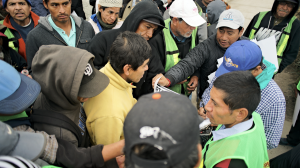New Caravan Expected to Leave Honduras Headed for U.S. Border

Close to 1,500 migrants have departed from Honduras in two separate groups headed for the U.S.-Mexico border – tentatively Tijuana – with the intention of petitioning for asylum in the U.S.
The number is but a fraction of the 15,000 migrants that a Tijuana activist had assured would leave San Pedro Sula in the early hours of Jan. 15.
Because of the news of the potentially 15,000-member caravan, President Trump said during his visit to the Texas border that “a new, even larger is being formed in Honduras, larger than anything we’ve seen.”
However, only about 600 people left from San Pedro Sula and 900 more from other regions to meet up at the border with Guatemala and from there head north through Mexico towards the U.S. southern border, according to reporting received from Honduras through messaging app WhatsApp.
Although it is only one-tenth of the migrants heralded by the Tijuana activist, the Trump Administration took advantage of the news to decide to extend the deployment of 1,800 troops to San Diego and 3,800 more to the rest of the border until the end of September.
President Trump, now in the fourth week of the government shutdown to pressure for funding for a border wall across the southern border, tweeted that “a big new Caravan is heading up to our southern border from Honduras… Only a Wall will work. Only a Wall, or Steel Barrier, will keep our Country safe!”
On the other hand, part of the caravan may also be stopped by both the Honduran government, which has warned that they will be checking that caravan members have current passports and visas, as well as the Mexican government, which has announced a new program that would make it attractive for Central American migrants to remain in Mexico.
Mexico’s Federal Civil Protection Director David Leon stated via phone that migrants entering Mexico would be offered employment in the country’s southern states through a program called “Cortinas de Prosperidad (Prosperity Screens)”.
The plan consists of employment offers for both Mexican and Central American men and women in several development infrastructure projects.
Applicants will be able to work in the construction, maintenance and operation of the Tren Maya (Mayan Train), the largest infrastructure project in Mexico in 3 decades, as well as the construction of a refinery in the state of Tabasco and the optimization of 6 additional refineries.
The third project migrants could participate in is the construction of the Trans-Isthmus Rail Line, a project that could compete with the Panama Canal by connecting the Coatzacoalcos ports in the Gulf of Mexico to the Salina Cruz Port in the Pacific.
Leon stated that with the “Prosperity Screen” projects, which could employ as many as 100,000 people, Central American migrants could find security and permanent, well-paid jobs in Mexico, precisely the things migrants leaving Honduras, Guatemala and el Salvador say they leave their countries in search of.
The projects also offer two additional perks: since the migrants would be working for the Federal Government, they would receive health insurance and other benefits, plus, they would be working in a region in Mexico that has strong cultural, business, and even family ties with Central America.
There will still be those migrants who will prefer to continue on to the U.S. border to petition for asylum. In their case, Tonatiuh Guillen, Mexico’s National Immigration Institute director, has stated that they would be welcome in Mexico, so long as they enter the country legally and in orderly fashion.
Olga Sanchez, the country’s interior minister, explained that entry would be allowed to about 300 migrants at a time.
No one has come forward to claim being the organizers of this third caravan from Honduras. Potential migrants found out about it through social media posts with the message “We seek refuge. In Honduras, they kill us.”
A Honduran newspaper attributed the creation of the caravan to NGO Pueblo Sin Fronteras (People Without Borders); however, the group has denied their involvement.
As this is happening, just under 1,500 Central Americans still remain in Tijuana from the previous caravan.





